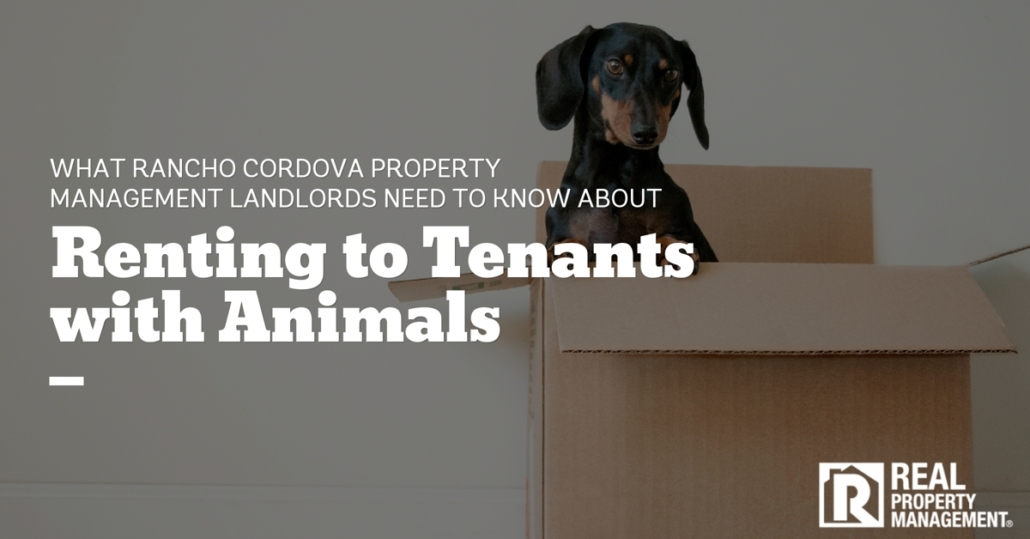What Landlords Need to Know About Tenants with Animals
You have heard the saying, “A dog is a man’s best friend.” It is no secret that people love their pets. In fact, a Zillow research study found that 41 percent of renters list allowing pets as a requirement. Pets come with pros and cons. If you allow pets, you open up the rental field to more potential renters. On the flip side, if you allow pets, you open your home up to risk of damage – – urine on your carpets, damage to baseboards if they have a puppy, lawn damage, and much more. What if someone has a service animal? This is a whole different ball park. Service animals cannot be discriminated against. There are many laws you must follow if you receive an applicant with a service animal. Rancho Cordova property management team, RPM Select want landlords to be successful and avoid lawsuits. Below you will find answers to your questions regarding pets versus service animals.
What is the Difference Between a Pet and a Service Animal?
Let us be clear, a pet is not a service animal. And a service animal is not a pet. According to Title II and Title III of the Americans with Disabilities Act (ADA), a service animal is any dog that is individually trained to do work or perform tasks for the benefit of an individual with a disability, including a physical, sensory, psychiatric, intellectual, or other mental disability. These tasks include pulling a wheelchair, alerting a person to sound, picking something up when dropped, pressing a button, or alerting a person to take medication. An emotional support animal is not a service animal. Rancho Cordova property management experts want to be clear that the work or tasks performed by a service animal must be directly related to the individual’s disability. A doctor’s note is not sufficient to claim a dog as a service animal. The following list of service animals that fit the ADA description include:
- A guide dog or a seeing eye dog (severe visual impairments or blindness)
- Hearing or a signal dog (hearing loss or deaf)
- Psychiatric service dog (reminder to take medicines, turning on lights, PTSD, etc)
- Sensory signal dog (autism)
- Seizure response dog (seizure disorders)
Remember, if a rental applicant lists that they have a service animal, you cannot inquire as to why. The person with the disability cannot be asked about the nature or extent of the disability. They can only be asked the following two questions:
- Is the animal required because of a disability?
- What work or task has the animal been trained to perform?
These questions should not be asked if the answer is obvious.
A pet is a domestic animal kept for companionship or pleasure. Rancho Cordova property management teams too often see people trying to pass off their pets as service or therapy animals.
Service Animals and Housing Laws
A landlord or professional management teams cannot discriminate against a person with a service animal. Under the Fair Housing Act, a landlord or homeowner’s association must provide reasonable accommodation to people with disabilities so that they have an equal opportunity to enjoy and use a dwelling. While emotional support animals are not protected under the ADA, they can be considered as reasonable accommodations under the FHA.
If landlords do choose to allow pets on the property, they can charge a pet deposit upon move in. A normal pet deposit ranges between $200 and $500. This protects the property owner if damage is done by the pet during the time that it resided at the property. Charging an extra deposit, however, is illegal when it comes to a service animal. Property management Rancho Cordova teams can ask a person to certify the following when accepting an application from a tenant with a service animal:
- that the tenant or a member of his or her family is a person with a disability
- the need for the animal to assist the person with that specific disability
- that the animal actually assists the person with a disability.
Landlords may not set weight, size or breed restrictions on service animals.
Rancho Cordova Property Management Rights
Landlords are permitted to exclude a service animal if it causes a fundamental alteration of the goods and services provided to other tenants, or if the animal poses a direct threat to the health and safety of other tenants. Examples include a barking dog that keeps other tenants awake during the night or fecal matter left in the common area without getting cleaned up by the owner. Property management teams must document the evidence of these nuisances when they occur in order to exclude a service animal from the property. If you have any questions regarding service animals on your property, contact a lawyer.
The Bottom Line
Property management Rancho Cordova teams cannot discriminate against persons with service animals. They can choose to allow pets or not. They can charge for a pet deposit, but not for a service animal deposit. Landlords cannot inquire as to why the applicant or tenant needs a service animal. They can ask if the animal is required because of a disability or inquire as to the work or tasks that the animal has been trained to perform. Landlords cannot require a demonstration from the animal. If you have questions regarding a service animal on your property or renting to someone who has a service animal, contact your lawyer.




